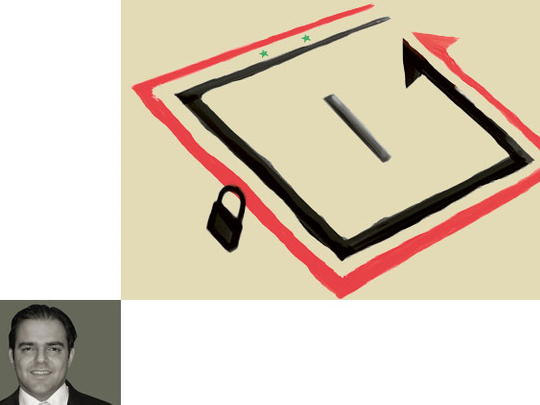
Syria’s new parliament will be inaugurated this week. It will likely be packed by the Baath party and its sister parties in the National Progressive Front (NPF) that collectively won approximately 160 out of the 250 seats; similar to the quota given by the Syrian officialdom since 1973.
In complete denial of the world that has fallen apart around them, the Baathists insist on holding on to power, regardless of the horrific death toll in the country, or what people are saying about them. They will march into parliament straight-faced, snubbing public outrage at yet another chamber of ‘yes-men’, promising — sadly — yet another rubber-stamp parliament.
To start with, the parliamentary elections that took place on May 7 were held at the wrong time, for the wrong reason, and with the wrong candidates. Instead of heralding real democracy in Syria, all the elections did was cement Baath party rule, which angry Syrians have been struggling to end for 13-months now.
The candidates running for office included none of Syria’s real community leaders, religious leaders or members of the country’s traditional and powerful business families, nor members of the Syrian opposition, or seasoned independents who command real respect on the Syrian street.
People of such calibre stayed at home fearing taint to their reputations should they join such a lopsided chamber. Islamic figures, like the Muslim Brotherhood were constitutionally barred from campaigning. As a result, the only candidates were either Baath party members, ‘independents’ allied to the Baath, political nobodies, or members of the NPF, like the Syrian Communist Party, for example.
A handful of newly established parties did contest the elections, only to withdraw from the race midway claiming that they could not compete with the Baath, which already has the advantage of a massive membership base, approximately 2.8 million, control over state institutions and funds.
All these new parties are small, inexperienced and young, with the oldest dating back to August 2011. Despite that, their first political challenge was a head-on confrontation with the Baath, where the chances of victory were comically slim. The Syrian Arab Solidarity Party, for example, put forth 16 candidates, but 11 of them dropped out before Election Day. Emad Al Deen Al Khateeb, founder of the Solidarity Party, lashed out against the elections, saying that it was wrong for them to be held in the first place, when more than a handful of Syrian cities are up in flames.
A horrific death toll is being recorded daily in places like Homs, Idlib, and Daraa. Al Khateeb defended his party’s decision to steer clear of the election saying: “It would be madness to join a losing battle,” adding, “I don’t believe that the nine newly established parties are real parties, because they are affiliated with the regime, rather than the Syrian Street.”
Six of the nine newly established parties, he noted, “are completely loyal [to the regime]”.
By law, candidates cannot use public office for election purposes, yet all those administering polling stations were state-employees, affiliated to, or members of the Baath. Additionally, several of the Baath candidates already hold government office, like president of the women’s or student’s unions, giving them an automatic advantage over independent candidates thanks to the massive networks already at their disposal, which of course, are off-limits to non-Baathists.
This explains why in Damascus alone, for example, the Baathists and their allies won 19 out of 29 seats, while the remaining 10 went to regime-friendly candidates.
Coinciding with Syria’s election was Algeria’s parliamentary poll, which saw a neat victory for President Abdul Aziz Bouteflika’s National Liberation Front. His party won 220 out of 462 seats in parliament. It was business as usual in Algeria, regardless of the Arab Spring, and business as usual too, in Damascus.
Now that the Baath regains a majority in the Syrian parliament, it will get to name the speaker of the new chamber. It will also get to name the new prime minister since the Constitution requires the current government to resign the minute a new chamber is inaugurated.
That fits in nicely with Baath party ambitions, especially that it already controls key posts like the ministries of defence, interior, information, foreign affairs, and justice. Either the present prime minister Adel Safar (a Baathist) will stay in power, or a new Baathist will be chosen, based on the new ‘majority’ in parliament.
In looking back at the reasons for this failure, it is safe to say that the Baath party affiliated itself with the wrong people, the wrong parties, and the wrong allies for over four decades. Rather than preserve the other political parties that operated in Syria prior to 1963, it actually eliminated them all, so as not to operate in a competitive political environment.
As a result, with nobody around to challenge or question them, the Baathists simply sat back and enjoyed the luxuries of power, without lifting a finger to improve their thinking, structure, or behaviour. That is why they cannot accept the notion of stepping aside today, after 49 years in power. They failed to realise how fast times have changed and how outdated they have become. One of the reasons is that if they look around for advice, all they see are shadow parties in the NPF, who rather than aiming to reach power, as any serious party would, are instead, only interested in sugar-coating Baath party rule.
An Arabic saying goes; ‘If you spend time with ducks, you will never learn to fly!’ The NPF parties are indeed nothing but ducks, creating Baath party members that are now firmly grounded. They contested this parliament election surrounded by ducks, rather than eagles and falcons, because of their own malpractices.
Meaning, it is back to square one for Syrian democracy.
Sami Moubayed is editor-in-chief of Forward magazine.









